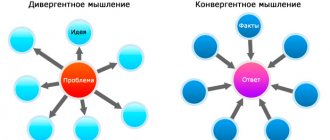Genius is the highest level of unique realization of the creative, mental, and active capabilities of the individual, which are expressed in science, creativity, and inventions. These are achievements that can bring some area of human manifestation to a new level of development. Human genius is associated with the concepts of inspiration, innovation, originality, and implies the highest degree of productivity and speed of implementation relative to the average representative. Points of view regarding the definition of genius are varied, from a divine spark to the condition of mental abnormalities. Psychoanalysis considers genius as the fruit of the sublimation of intimacy, the Gestalt approach as the individual’s ability to gain insight.
In psychology, genius is a unique deviation from the norm of the majority, which is less common than all other deviations, and has accompanying other deviations relating to the body.
Genius is one of the most elusive and most fascinating concepts in psychology. What is super-giftedness and the exact parameters of its definition have not been established. Scientists, philosophers, and psychologists have made numerous attempts over the centuries to explain the nature of the emergence of genius. However, it is generally accepted that genius involves creative abilities that exceed the level of the average person, which relate to any field, i.e. a person of genius is capable of fairly high results in areas that are not related to his main talent. These skills are assessed in the context of social culture and the time in which a person lives, because genius is a social phenomenon and can only be considered by comparing socio-temporal conditions.
Human genius is determined by four types of theories.
The pathological theory finds a connection between genius and madness; arose from observations of geniuses who often exhibited nervous disorders, trance states, a tendency toward neurosis, and so on. Features characteristic of geniuses are also inherent in the insane (unconsciousness of creativity, increased sensitivity, sudden changes in mood, etc.), but people with mental disorders do not produce brilliant creations.
In psychoanalytic theory, genius is explained not by the presence of any super abilities in a person, but by the direction in which they are directed, how they are applied and developed under the influence of motivation. This is where the idea of sublimating sexual energy into creative activity is born, as well as compensating for one’s shortcomings through the development of other qualities.
In the theory of genius of qualitative superiority, the idea that geniuses have shortcomings is not allowed; they are recognized as a more highly developed, distinguished from the rest, type of people, possessing more developed abilities.
The theory of quantitative superiority defines agility not in terms of special abilities, but as a favorable confluence of social and economic factors for the development of abilities that are equally inherent in the human being.
Genius is studied through biographical analysis, statistical research, intelligence research, longitudinal research, and various other combinations of these and other methods.
One of the description methods is the theory of multiple intelligences. She distinguishes linguistic (writers and poets), mathematical-logical (scientists, financiers), spatial-visual (artists, photographers), musical (composers, musicians), kinesthetic (athletes), interpersonal (lawyers, politicians), intrapersonal (philosophers, psychologists, priests), naturalistic (farmers, botanists) intellects. These types have approximately the same distribution throughout the population and determine the predominance of abilities in the corresponding areas. A person with genius has well-developed intellects of several types.
Who are geniuses, and what does psychology say about genius?
Genius is perhaps one of the most mysterious phenomena.
The birth of a genius cannot be planned or predicted; it always happens suddenly and, as a rule, leaves a deep mark on the history of mankind. Such people are able to change any ideas about science, art and other important areas of life. Any of us knows their names: Wolfgang Amadeus Mozart, Isaac Newton, Leonardo da Vinci, Johann Goethe, Blaise Pascal - this is only a small part of the geniuses who influenced the development of mankind. The nature of this phenomenon has long been subject to close study, but there is still no exact answer even to the initial question: what is genius? Scientists' opinions differ quite widely.
- Plato believed that genius was given to man by God.
- The Italian psychiatrist Cesare Lombroso was convinced that it was a symptom of madness, and even wrote a book on this topic, “Genius and Insanity.” Indeed, many geniuses fell into madness, but not all.
- Some other scientists believe that genius is the sublimation of sexual complexes.
These three versions are far from the only ones; each direction of psychology and psychiatry has its own theory. Moreover, none of them has such comprehensive evidence to once and for all give an accurate definition of genius.
General Definition of Genius
Despite the global differences in the views of scientists on this phenomenon, there is still a certain common denominator that generally provides an acceptable definition. Genius is the highest level of human development in one or more areas of knowledge and skills. Moreover, such people do not go unnoticed, they always make some outstanding discoveries, invent something new - in general, one way or another, they prove themselves.
Sometimes genius is confused with talent and giftedness. In fact, there are several important signs that help distinguish one from the other.
Giftedness
Giftedness is an overall high level of ability. Gifted people can successfully cope with a task, as well as develop qualitatively and quickly. Many young children initially have this quality, which is why starting early is considered so important. After all, giftedness, with the right approach, can develop into talent.
Talent
This is the next step after giftedness. Talent is considered an even higher level of ability. But, as a rule, this happens in one direction. The popular saying “A talented person is talented in everything” is not entirely true. Usually, having passed through the stage of general talent, a person begins to pay more attention to what is most interesting to him. Accordingly, the main development further occurs in this area. This does not mean that a talented person's abilities are limited, it is usually simply a matter of lack of time. Who knows how much these people could do if the days were just a little longer.
Genius
Finally, we come to the third stage of ability development. This is genius. As mentioned above, at this stage is the highest point of development. Like talent, genius is usually limited to one area. The difference is that in other areas of life a brilliant person can be downright stupid, while talented and gifted people are usually more or less versed in any field.
Abilities and their types
Abilities are a complex formation, a set of very different qualities of a person that give him the opportunity to achieve success in a certain activity. It is the opportunity, but whether this potential opportunity becomes a reality, depends on the hard work, perseverance and determination of the individual.
Abilities are formed and developed throughout life. There are cases when people achieved success in painting, literature, and invention at a fairly mature, or even old age.
The basis of abilities are natural inclinations, which are congenital (but not necessarily hereditary) in nature, for example:
- ear for music;
- high sensitivity to color discrimination;
- large lung capacity;
- increased activity of the right or left hemisphere of the brain, etc.
It is difficult to achieve success without the inclinations, but a person’s natural qualities do not guarantee it. Inclinations can develop into abilities only in the process of mastering an activity, systematic study and hard work.
Along with special abilities associated with a specific activity and manifested in it, there are also general abilities, primarily cognitive. You cannot do without them in any activity. A person with a low level of intelligence or poor memory will not be able to become an outstanding composer even if he has a phenomenal ear for music. The level of general abilities determines the efficiency and speed of obtaining, storing and processing information and the effectiveness of human interaction with the environment, including society.
This is a set of inclinations that presuppose a high level of general abilities, most often called giftedness.
Signs of genius
- Powerful intuition. As a rule, a genius does not need to have the full range of knowledge in the desired field. What he lacks in information, he more than makes up for with actions on a whim.
- Developed imagination. It is this that serves as a guide for genius, giving the opportunity to create without relying on existing standards.
- Uniqueness. As a rule, geniuses do not develop what they already have, but create something fundamentally new, different from everything that came before.
- Perseverance, attentiveness, hard work. Without these qualities it is difficult to achieve anything. And a genius, as we have already said, must definitely leave his mark on history.
- Maximum passion. It doesn’t matter what field we are talking about, science or art - when a genius creates, everything else ceases to exist for him.
- A high self-evaluation. Geniuses are usually absolutely self-sufficient individuals. They believe in themselves and their business. Such an attitude is simply necessary so that a person can give all of himself to what he does.
Genius has one more feature. A person’s ordinary abilities can be developed into giftedness, and then into talent. But not genius - this is a quality that either exists initially or does not exist at all. Usually a genius is visible in early childhood, while talent can manifest itself at any age, even old age.
Scientists will probably struggle for a very long time to figure out who a genius is, thanks to what factors he is born, and why he is so rare.
One thing is obvious: no matter what area genius manifests itself, it will always be able to declare itself and will certainly leave a deep mark in the history of mankind.
Virginity and masturbation
Agree, at the end of the first part of American Pie it was immediately clear to everyone who was smarter!
There is an opinion that an intelligent person spends less time on sex. The reasons for this indicator may go much deeper than the simple explanation that no one wants to hug assholes.
But scientists recently conducted a study in which they determined that the number of sexual partners among more intelligent students is significantly lower than among their colleagues with average intelligence. Also, the virginity rate of smarter people is 45% higher than that of the general student population.
But there are a number of scientific explanations for all this:
1 Science has proven that the hormone testosterone can suppress intelligence, which means that smarter people have significantly less of it, which makes them less aggressive and relegates girls to the background.
2 An intelligent person thinks more often about the risk of pregnancy or illness and is aware of its consequences.
3 If a person is able to teach himself, most often he will lead a reclusive lifestyle and looks at parties and parties as an unnecessary risk. We should also not forget that introverts are also uncomfortable being in large crowds of people, and masturbation or abstinence does not pose a risk at all.
What is genius
Genius is the highest degree of manifestation of creative or intellectual potential. Unlike talent, genius is narrowly focused and develops mainly in only one direction. Very often a compensatory effect is triggered. According to the principle, if there is a lot somewhere, it means there is little in something else. Geniuses can be people who are unadapted to real life. If you put talent and genius on the scales, then it is better to choose the first. It is better to be a well-rounded person.
On the other hand, geniuses think completely differently from what is customary in society, because something that could upset an ordinary person will not cause negative emotions in them. They will be so caught up in being successful in their field that they may not notice anything else. Receiving moral satisfaction from the fact that they were able to create yet another brilliant invention, they will not even think about why it is so difficult to find a common language with ordinary people, especially with representatives of the opposite sex.
Talent and genius are different degrees of development of human potential. Both of these qualities are laid down at the genetic level. Talent is in the form of inclinations or abilities, and genius is the only development strategy.
As history shows, if certain conditions are required for the development of talent, then geniuses can be made anywhere. That is, a person will be talented thanks to someone or something. He will become a genius in spite of everything. But it is impossible to predict at what age this will happen.
What factors influence the speed of implementation?
As was said earlier, genius can not only be realized faster, but also ruined. In the second, human society has achieved particular success. The social environment is the catalyst or inhibitor that determines the realization of natural talents. What factors have a significant impact?
- Methods of education. Imperative education suppresses initiative. In this case, the person becomes lethargic, weak-willed, and does not show independent interest. By encouraging initiative, it is possible to achieve the realization of the natural qualities of the individual.
- Possibility of free creative realization. That is, sufficient freedom of action, without control from parents and teachers (except for reasonable control to ensure the safety of the child and direct the creative spark in the right direction).
- Amount of free time. The more it is, the more effective the development. Provided that the resource is spent correctly.
- Environment. It influences in a significant way.
- Material component. Satisfying natural basic needs. With a sufficient degree of satisfaction of needs, an adequate environment for self-realization and development arises. Although, sometimes, need also becomes a catalyst for rapid development.
These are the main points. In fact, the speed and quality of development is influenced by even more factors: from health to motivation.
How to recognize a genius?
There are no clear criteria showing genius, but we can still talk about certain patterns inherent in such people. Geniuses with a unique perception of the world, a unique attitude towards familiar things. They may not even notice something that, at the everyday level, will unbalance another person. But something unusual will cause them to become truly depressed.
For example, brilliant children will not be upset at all if they are not bought some kind of toy, but they will lose the meaning of life for a long time after learning that Einstein’s theory has been refuted.
The main signs of genius:
- Comprehensive consideration of any issue and depth of thought;
- Visualization of thinking;
- Tendency to constant experimentation;
- Combination of incompatible things;
- Ability to see analogies and metaphors;
- Developed intuition;
- Specific sense of humor;
- They don’t stop in a dead end situation, they always look for a way out.
But let’s immediately make a reservation that this applies only to the selected activity. In ordinary life, such people may not notice the obvious. Therefore, it is correct to distinguish several types of genius.
Types of genius
To make it easier to recognize genius, you should understand what forms it can take:
- Practical – “golden hands”, the ability to tinker, repair, design, create something new;
- Scientific and academic – “bright mind”, success in studies, research activities;
- Everyday life is a rare type of genius that helps you navigate life;
- Sports-physical – high level of strength, coordination, balance, agility, flexibility, endurance;
- Creative – developed imagination and the ability to realize it, implementation in the creative process;
- Emotional – the ability to understand others, feel and sympathize, developed empathy;
- Entrepreneurialism is the most interesting type of genius for many, allowing you to literally attract money to yourself.
There are also two types of genius related to the scale of its implementation. In the first case, we are talking about people who very quickly switch from one search to another, all the while remaining open to something new. In the second case, the life of a genius is closely connected with one work, which he will hone and improve until his last days.
About testing for genius. How to diagnose a person’s originality?
Testing in such a context is very difficult. Especially if the test is carried out on a child. The rudiments cannot always be recognized immediately; sometimes more than one consultation is required. The issue of diagnosis is dealt with by specialists in clinical psychology. The psychologist must have sufficient experience, otherwise the results will be inaccurate or completely false.
There is no single test for genius, since we are talking about an integral quality that combines three characteristic features:
- High level of intelligence.
- The ultimate level of creativity.
- High flexibility and mental agility. Also her activity.
As part of the examination, special events are prescribed.
Oral conversation
Allows you to evaluate the logic of statements and the structure of the subject’s speech. Also direct the conversation in the right direction and lead to certain actions. Provocations are also used to understand how a person gets out of difficult situations. Here, again, the specialist is required to have sufficient experience and impeccable adherence to the rules of formal logic.
Torrens test
In different modifications. As part of this testing, special stimulating graphic material is used: figures, lines. The subject is asked to complement the drawn forms at his own discretion to create complete images or even compositions. A psychologist does the decoding. Upon completion, a final score is assigned. Depending on the result obtained, we can talk about both very low and extremely high creative potential of the individual. Before testing, especially if a child is being tested, you need to carefully explain the rules to avoid misunderstandings and false underestimation of the results.
Intelligence tests
Ravena, Eysenka, other modifications. Of course, taking into account the age of the subject. The questions that are used are divided into categories - from logical (which figure is extra) to mathematical, based on simple calculations. Also verbal, assessing the ability to perform operations with linguistic units. Some tests only use a graphical representation of the material. The use of various tests and questionnaires allows you to obtain the most accurate and unbiased results. In such a situation, errors are practically eliminated.
Observation of the behavior of the subject. Assessing his interests and preferences
Conclusions are drawn based on observations and the specialist’s own understanding. Although there are no formal criteria, the signs of a person’s genius are quite clearly visible.
How does genius manifest itself? Among the features:
- high intelligence - in adulthood, the limit indicating exceptional abilities lies at the level of 145-150 units and above, depending on the individual characteristics of the individual, this number may be more or slightly less;
- the maximum level of creativity is originality of thinking, even in standard situations such people come to paradoxical and non-standard conclusions, which is noticeable when conducting tests;
- well-developed imagination - found in everyone, but at the same time, it does not always allow one to effectively engage in artistic activity in a broad sense; in childhood, imagination is especially noticeable; during diagnosis, this makes the task easier;
- multitasking - the ability to solve several problems at once in parallel, is found not only among geniuses, but for them this quality is organic and does not require special efforts for development or ongoing implementation;
- mental flexibility - the ability to quickly switch from one issue to another, is accompanied by a sufficient level of mental energy, this in turn determines the extreme performance of such people, they rarely get tired and quickly regain their strength, with a willingness to continue working;
- multipotentiality - that is, the development of extraordinary qualities in several areas at once; often extremely gifted people are able to work productively in several areas at once;
- sensitivity - high sensitivity, susceptibility to external factors, stimuli and other factors;
- curiosity.
Such criteria of genius are difficult to identify in one consultation. You need to observe for a certain time to draw conclusions.
Is it possible to develop genius?
The question of developing genius in yourself or your child raises doubts, but still, if someone needs it, let’s consider how to do it. Although genius is determined genetically, one should not deny the role of the environment in its development. The main thing is to do this voluntarily, without violence against the individual. After all, brilliant children should appear by choice, and not by the whims of their parents. Otherwise, you can ruin a child’s life and take away his future.
Good ways to develop genius are intensive improvement in your field, constantly leaving your comfort zone and communicating with other talented colleagues in the industry. The techniques are simple but very effective.
It's difficult to say what genius is. For some it becomes a gift, and for others a curse. Especially when it comes to child prodigies. Therefore, brilliant children evoke opposite emotions, from delight to feelings of pity. But sometimes the choice is made for a person, and genius becomes someone’s destiny regardless of his true desires. Is it good or bad? Who knows. If the stars light up, it means someone needs it.
Where does the word "genius" come from?
Pessimist - what kind of person is this?
In Latin this word will be written as genius, translated as “spirit”. Even in the mythology of ancient Rome, there were spirits - geniuses (personal to humans). It was believed that especially outstanding people had a strong personal spirit. Therefore, since the time of Gaius Julius Caesar (Octavian Augustus), this word has become synonymous with the words “inspiration” and “talent.”
Interpretation of the word











